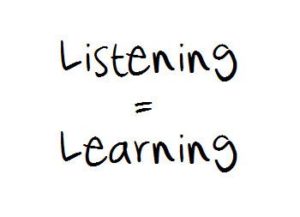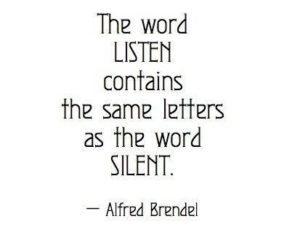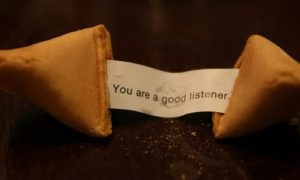Connect: Listen
“When you are listening to somebody, completely, attentively,
then you are listening not only to the words,
but also to the feeling of what is being conveyed,
to the whole of it, not part of it.”
― Jiddu Krishnamurti
Last week, my close friend mentioned to me that he was stressed and not sleeping well. He looked exhausted, he was not his usual cheery self and I could sense that there was something worrying him. He obviously needed someone he trusted to help. I knew one way to do this was to just ‘be available’ or to go somewhere quiet and private, then simply listen. To my shame, I didn’t do this. I told my friend it was a shame he wasn’t in a good state but then I rushed away, saying I would catch up with him later, as I disappeared down the corridor.
I have felt guilty and disappointed in myself ever since.
That was an opportunity to bond with my friend, to deepen my knowledge of him and to be of use, as I would always appreciate him doing for me. But I didn’t do it. That chance is now gone.
One essential part of our ‘Five Ways to Wellbeing’ model at Sha Tin College is CONNECTING. In our community, we aspire to learning and growing every day. We believe in taking responsibility for fulfilling our own potential and that of others. We prioritise positive, friendly relationships and recognise that building social connections is important for our wellbeing, our feelings of happiness and our self-worth. We are enriched when we contribute in lessons, get enthusiastically involved in social or community groups, sport, activities and service.

Feeling close to, and valued by, other people is a basic human need. It’s important for us all. Connecting also protects our mental health. In our busy world, though, we are often racing and we are generally not very good at genuinely and actively listening. We hear what others say but need to reflect upon whether we are connecting or just making contact. How can we re-focus on listening so it is helpful for the other person and meaningful for us?
Hearing is a passive physical process but it doesn’t demand anything of us. Listening is a conscious act. We make a decision to give our attention to the listener. This shows respect and a desire to value the wisdom of others. Active listening requires us to be curious, patient and to demonstrate empathy.

For example, when we ask someone ‘How was your weekend?’ we could stop, look her/him in the eye and pay close attention to the answer. This includes being attuned to the non-verbal signals the other person is sending; these are often more significant than words alone. We could disconnect from our phone, laptop or iPad and honour the other person by giving her/him time to tell us about their weekend. We could ask someone to sit with us for lunch so we can listen to how she/he is feeling about something. This is kind and thoughtful. It sends the message that the other person is worthy of our time and attention. We could suggest travelling home on the bus or train with a friend – this is making a special place in the day dedicated to listening to the other person.
Empathetic listening can be learned and improved with practice. Here are tips which help:
- Face the speaker and maintain eye contact
- Nod, smile and find ways which indicate you are paying attention.
- Don’t interrupt! Wait for the person to complete a thought. Active listening is not about rehearsing what your response will be when the other person is speaking.
- Ask questions and seek clarification if there’s anything you don’t understand. You could use the phrase: ‘Am I understanding you correctly?’ Alternatively, you can paraphrase what you heard. The speaker will correct you if you’ve misunderstood.
- Listen intelligently – what is the underlying meaning of her/his words?
- Don’t make any judgements
- Mirror what the speaker says, for instance, by repeating it back to them: ‘It sounds like you’re saying… and that has made you feel….’.
- Empathise. Try sentences like ‘That must make you feel…’ or ‘It makes sense that given what happened that you would feel like that’ or ‘I can imagine that would be really hard’ are empathetic
- Do NOT give advice unless the speaker specifically asks you for advice and keep in mind that you are not a ‘problem solver’ so there is no need for you to ‘fix things’.

Of course, none of us agree all the time, but this is not the point of active listening.
Active listening is advantageous. It is useful to know all the relevant information before making a decision. Listening is what makes this happen. Active listeners have enhanced powers of persuasion because they encourage mutual feelings of respect. Listening to others can help us all see new perspectives or opportunities. People want to be around good listeners. They will share their points of view and insights. Most of us enjoy speaking about ourselves sometimes, but dominating conversations by bragging about our achievements, moaning about our problems or making assumptions about others due to ignorance results in people being fed up with our egocentricity and avoid us.
Be proud of yourself for connecting with others for altruistic reasons. It is mutually beneficial.

Here are some amusing clips which emphasise the significance of listening:
Active Listening. How to be a great listener
https://www.youtube.com/watch?v=z_-rNd7h6z8
TED Talk – The Power of Listening
https://www.youtube.com/watch?v=saXfavo1OQo
Bad Listening (The Big Bang Theory)The Big Bang Theory ‘Please pass the butter’ conversation (Amy + Sheldon)
https://www.youtube.com/watch?v=6TeOGJP5vGA
References –
Are You Hearing or Listening? Five Benefits of Listening
https://www.linkedin.com/pulse/you-hearing-listening-five-benefits-jan-johnston-osburn/
The Art and Value of Good Listening
https://www.psychologytoday.com/us/blog/high-octane-women/201209/the-art-and-value-good-listening?collection=107271
Simple Keys to Effective Communication
https://www.psychologytoday.com/us/blog/think-well/201107/simple-keys-effective-communication?collection=107271
What is empathetic listening?
https://medium.com/we-learn-we-grow/what-is-empathic-listening-34a164f572a0#targetText=Empathy%20refers%20to%20emotionally%20connecting,to%20you%20for%20a%20solution.
Why it’s important to be a good listener
https://www.relate.org.uk/relationship-help/help-relationships/communication/why-its-important-be-good-listener




